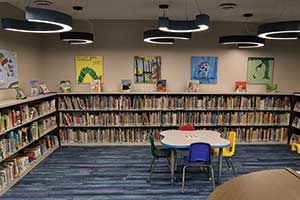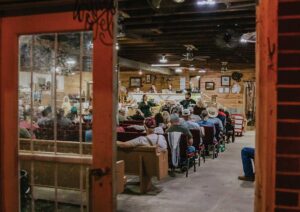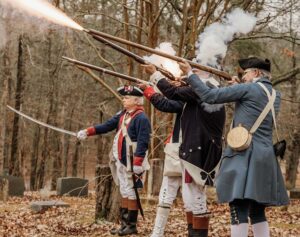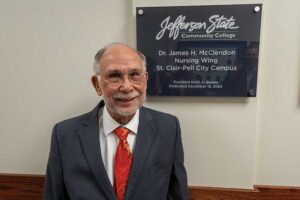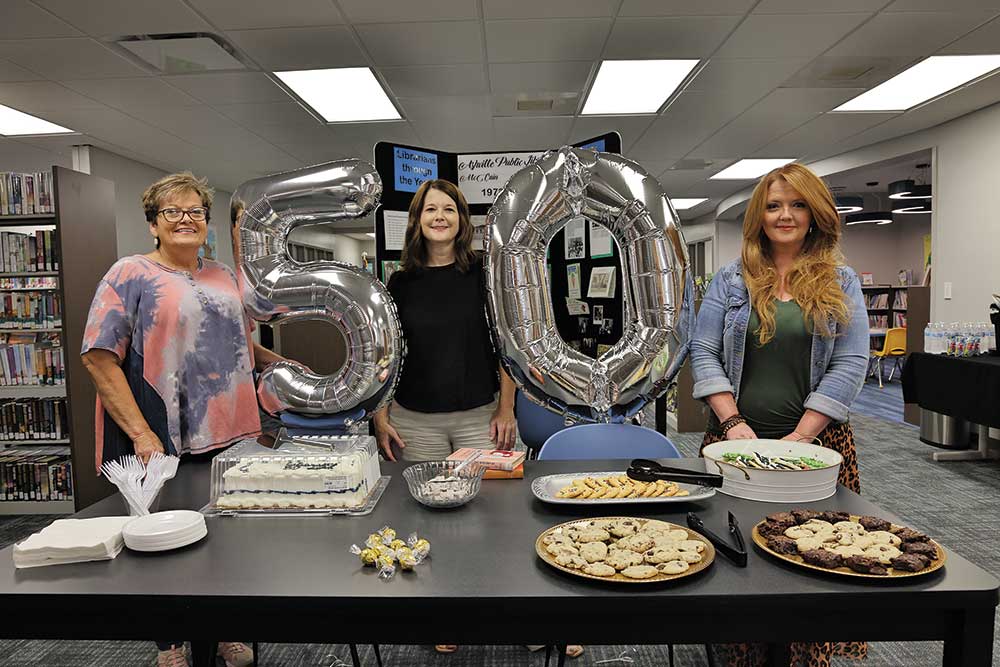
Ashville Library celebrating five decades of service
Story by Scottie Vickery
Photos by Richard Rybka
When you consider what a public library has to offer residents, the most obvious answer is books.
If, however, you ask Paula Ballard and Gail Walker what the library in Ashville offers their community, they give a completely different answer. The most vital gift it provides, they say, is connection.
The McCain Memorial Public Library in Ashville, formerly known as the Ashville Public Library, turned 50 last month, and Ballard and Walker were among the many who celebrated its five decades of connecting patrons to information, book lovers to adventure and people to people.
“The town of Ashville is surrounded by rural communities, and people do come here to make connections,” said Walker, who lives in Shoal Creek Valley and is on the library’s board of directors.
Ballard, who has served as the library’s director for nine years and is only the ninth librarian in its 50-year history, said it’s not unusual for older residents to spend time in the library visiting with each other. “For some, it may be the only time they see other people that day,” she said. Ballard loves watching young mothers connect with each other while their children become friends during story time and other activities.
The library, one of seven in St. Clair County, moved to a new and larger location last year and offers nearly 18,000 items for circulation. In addition to books, there are DVDs, magazines, audiobooks, board games and learning tablets for children. They offer programming for adults as well as children, and many residents who don’t have access to a computer or who have spotty Internet service make use of the facility’s computer stations.
“We fill a lot of needs, so we’re more than just books,” Ballard said, adding that she provides computer assistance every day. “You can’t walk in and apply for a job on paper anymore; you’ve got to do it online. We scan, make copies and fax so people don’t have to drive to Gadsden or Birmingham. We have DVDs because not everyone has reliable streaming. We have people who sit in the parking lot to use Wi-Fi even when we’re closed.”
The first chapter
Although those who worked so hard to make the town’s library a reality in 1973 couldn’t have known the many ways the library would change lives in 2023, chances are good they would be pleased with the impact it makes. After all, their goal from the very beginning was to “improve the environment of our town.”
Members of the Ashville Garden Club got the ball rolling in the summer of 1972, according to a narrative written by Mattie Lou Teague Crow, who served as the Garden Club’s Environmental Improvement Program chair at the time and later became the first librarian. Ballard discovered the narrative in an old scrapbook during last year’s move.
Until then, the “library” consisted of several shelves of books provided by the Alabama Public Library Services, and they were housed in the Town Hall. One employee worked one afternoon a week, checking out books and writing overdue notices. The town clerk was responsible for the books the rest of the time.
“The collection had grown and was crowding the town’s office space,” Crow wrote. “The Garden Club had enjoyed a rewarding experience with our House Pilgrimage in 1972. Our bank account reached an all time high, and we were searching for a worthwhile activity.”
After meeting with the mayor and Town Council, it was eventually determined that the library could be housed in the previous Town Hall building, which had been empty for several years. Before it was over with, members of the community joined forces to make the project a success, and in a bit of foreshadowing, they built connections while they worked together.
According to Crow’s narrative, the town purchased two library tables, a desk, typewriter and filing cabinet, and the Garden Club members “reworked an old desk and chairs given by one of the schools.” They also provided new shelving, magazine racks and a card catalog cabinet. Local civic clubs bought sets of encyclopedias, and the mother of a soldier (James Robert Heard, Jr.) who was killed in Vietnam, donated the flag that was draped on his casket. In addition, local artists displayed their works at the library.
“By the time we were ready for our Open House, the entire town had become involved in our project,” Crow wrote.
Move-in day was Sept. 1, 1973. “The place had been made lovely with soft green walls, wall to wall carpet, new lighting and year-round air conditioning,” Crow added. “In a few days, all was in apple-pie order and the public began using the new library.”
Happily ever after
While that first library served Ashville well for decades, history has a way of repeating itself. In recent years, the library had begun to outgrow its space, parking was limited on the downtown square, and the city owned a building on US 231 that had been empty for a few years.
In addition to city funding, a generous donation from David and Louisa McCain, made in honor of the four generations of McCains who have called Ashville home since 1878, helped bring the project to fruition. The McCain Memorial Public Library opened in April 2022.
In addition to an ever-growing collection of books for adults, teens and children, there are study rooms and a computer lab. A grant from the Alabama Public Library Service, made possible by the Library Services and Technology Act, will allow the library to soon have six new computers for public use, a new staff computer, catalog station, and an iPad station for the children’s area.
Programming has grown, as well, with the library’s multi-purpose room. Larger events, like the annual Father-Daughter Dance fundraiser, are held offsite but having a dedicated space for programs has opened up a world of possibilities, Ballard said.
For adults, there’s a Book Club and weekly exercise classes. A group meets to crochet together twice a month, and adults and teens have enjoyed events like Harry Potter Trivia Night, ceramics classes, a beekeeping program, henna tattoo class and a hair tinsel tutorial.
In addition to weekly story time on Tuesdays at 10:30, children enjoy the summer reading program, which continues to grow in popularity. During the summer, kids enjoyed a variety of activities, including science demonstrations offered by the McWane Center, a visit from a llama, a rock painting activity and reading to dogs as part of the Greater Birmingham Humane Society’s Reading Buddies program. A monthly Lego Club is a big hit, and students’ creations are displayed each month between meetings.
“We’re proud of our new facility and what it enables us to do,” Ballard said. “We wanted this space to be inviting and cozy but look new and fresh. You want people to leave happy and wanting to come back.
Walker and Ballard, both avid readers, hope that children visiting the library today develop the same love for books they’ve enjoyed.
“I’ve always loved books,” Walker said. “My sister and I would each check out the maximum number of books, and then we’d share. It always opened up our imaginations. I think a love of reading is the single most important thing a child can have to be successful. If you can read, you can do anything.”
Ballard’s mother, Susan Kell, was the librarian at Ashville Elementary School for years, so reading has always been a part of her life. “I remember coming to the library all the time in the summers,” she said, adding that she feels fortunate that reading a wide variety of genres is now part of her job. “I read everything from young adult fantasy to psychological thrillers to romantic comedies.”
Knowing that Ballard is now guiding a new generation of readers would likely make Crow – Ballard’s great-aunt – proud. In fact, the words Crow wrote in 1973 still reflect the impact the library continues to have on the community she loved so much.
“Without a doubt, the library has improved the environment of this whole community,” Crow penned. “First it has furnished reading materials for inspiration and information and entertainment to people in every walk of life. It has brought civic groups together in greater harmony and cooperation. It has become one of the leading institutions for our small town, and our citizens are appreciative of the services.”











